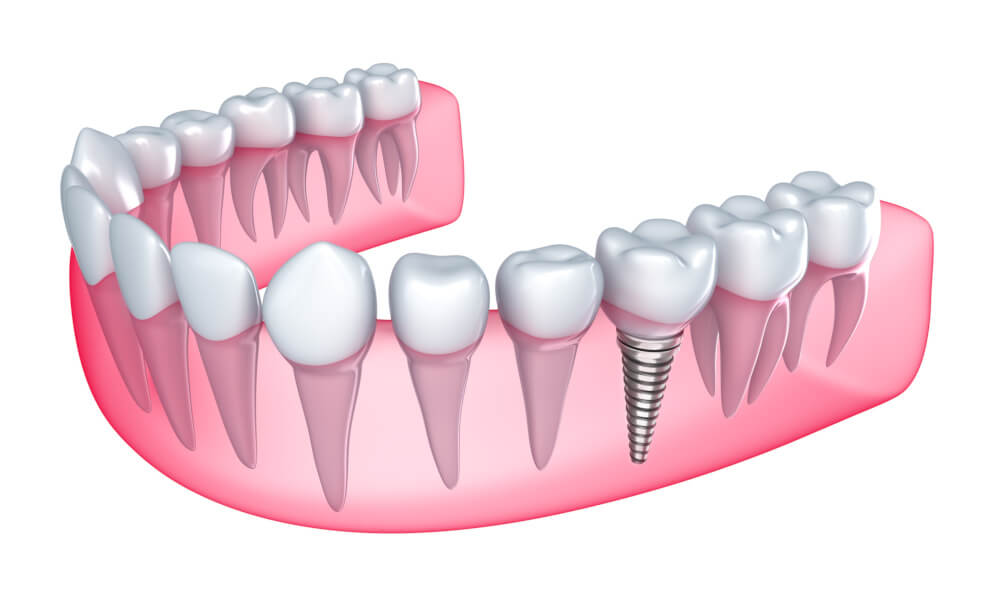A tooth implant is the only prosthodontic treatment for tooth loss that replaces both the root and the visible tooth. Depending on the number of teeth that are missing or damaged beyond repair, you may receive a single tooth implant, multiple teeth implants, or even full mouth dental implants. The single implant is a great option for patients who have lost a single tooth or have a single tooth that must be extracted due to irreparable damage.
Advantages of Implants Over a Dental Bridge
Dental implants have an advantage over other prosthodontic treatments in that they not only replace the tooth, but also the root. This means that they will look and function just like a healthy natural tooth.
For replacement of a single tooth, a dental bridge is often the other popular option. The dental bridge helps patients regain proper chewing function and aesthetics while preventing the shifting of the remaining healthy teeth. However, a bridge doesn’t replace the tooth root, and therefor doesn’t prevent the deterioration of jawbone that can occur when there is no root present.
The dental bridge also requires grinding down of the adjacent teeth on either side of the gap in order to support the bridge. Over time, this procedure can compromise the health of these teeth and cause the surrounding gums to recede.

For patients with a single tooth that is damaged beyond repair, a preliminary step of tooth extraction is required. If the tooth is already lost, this step can obviously be skipped. The actual implant procedure will take place once the gum tissue has healed from the extraction.
At our dental clinic, we understand that dental implant surgery is a big decision. Our dental specialists are dedicated to providing thorough consultation, so you have the opportunity to make an informed decision about your own dental health. Part of this process involves comprehensive evaluation of your dental and overall health to ensure you are a good candidate for the procedure.
For example, some patients who do not have sufficient jaw structure or have other serious underlying health conditions may not be recommended for tooth implant procedure. In some cases, a bone graft may be required prior to the implant to strengthen the jaw structure that will support the implant.
The actual implant procedure usually takes place over several months, beginning with the placement of a titanium post into the jawbone. This post acts as the root of your new tooth and will fuse to the bone like a natural tooth root, providing secure support. This fusion process can take several months, which also allows time for healing from the procedure.
At the subsequent appointment, an abutment will be placed as a foundation for the new tooth and an impression will be taken in order to fabricate the custom tooth, called a dental crown. Once the dental crown has been created, these can be placed at the final appointment.
When should I get a single tooth implant?
At our dental clinic, we place emphasis on the value of restoration over replacement, and prevention over treatment. We only recommend dental implants as an option for patients who are already missing a tooth or have a tooth that is truly damaged beyond repair.
If you are suffering from any kind of toothache, regardless of severity, we recommend that you see your dentist as soon as possible. Early diagnosis and treatment can help prevent more invasive procedures!
Why do I need to replace a single lost tooth?
Depending on the position of the tooth, you may not feel the need to replace a single missing tooth. While it may be a minor discomfort or inconvenience, it might seem like something you can learn to live with.
This may be true in the short run; however, a single missing tooth can cause long-term problems for overall dental health including the remaining teeth and even jaw structure. A gap in your teeth means that the remaining teeth are likely to begin shifting position, which can result in incorrect bites and jaw issues. And the lack of root structure in the gap can also cause deterioration of the jawbone that can lead to sagging or shifting facial structure over time.
How much does a tooth implant cost?
Average tooth implant cost varies depending on where you live and which tooth is being replaced, but generally ranges in the lower to mid thousands per implant. Compared to other prosthodontic treatments, the upfront cost is considerably higher. However, implants rarely require replacement or adjustments, resulting in its long-term value being comparable to or even better than dental bridges and dentures.
Dental implant surgery can be covered by some dental insurance policies. At our dental clinic, we accept a wide range of insurance plans including Medical Dental, and our staff are well-versed in the different insurances to ensure your out-of-pocket costs are kept to a minimum.